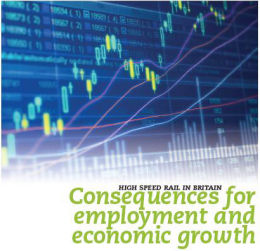Posted 3rd March 2010 | 3 Comments
High Speed rail ‘could create 47,000 jobs’

HIGH SPEED rail has the potential to boost Britain’s economy by more than two per cent and create between 25,000 and 42,000 extra jobs by 2040, according to a new study by accountants KPMG. The greatest economic gains – and jobs growth – would be in Yorkshire & Humber, Scotland, the North East, North West and the West Midlands.
A new high-speed network “really could” contribute to closing the North-South divide, according to Greengauge 21, the pressure group leading the campaign for high-speed rail developments in Britain, which commissioned the KPMG study.
“Like the original coming of the railways, HSR has the potential to transform the shape of the national economy and make a substantial contribution to economic growth,” says the new report, High Speed Rail in Britain: consequences for employment and economic growth.
It explains: “By 2040, HSR could leave national economic output up to 2.1 per cent higher than it would otherwise have been, essentially allowing the country to leap ahead one year in its economic growth.”
Developing a High Speed network in Britain could be the most significant and expensive transport investment in recent history, says the report. But, it adds: “It is widely felt that an investment of this scale could transform economic geography and shape development for many decades to come.”
To assess how High Speed rail could change Britain’s economic landscape, Greengauge says KPMG “found it necessary to take a different approach from the one usually taken by the Department for Transport when it appraises transport investments.” Instead, KPMG examined transport investment from a different angle, asking: “How will HSR change the way that the national economy works?”
Dominic Walley of KPMG told a conference in Birmingham: “We must stop thinking about transport as a tax burden and think about it as a sustainable activity that helps bring tax revenues into the Treasury.”
According to Greengauge 21, “The impact of early railways on the physical location of economic activity in Britain was immense. The changes brought about in the location of activity led to further growth in productivity as the cities provided the clusters of activity necessary for further specialisation.” It says that High Speed rail would being similar benefits in the 21st century.
Mr Walley added that a High Speed network would leave the average person “£400 a year better off”.
Reader Comments:
Views expressed in submitted comments are that of the author, and not necessarily shared by Railnews.

Mick Odell, Milton Keynes,, UK
More talk,we have a government who are prepared to spend £500m to convert the M1 near to where I live for hard shoulder running,but will not reopen the Bletchley to Oxford line for half that amount.I think this confirms where there priorities are.
Llion Wynne Jones, aberdare
Sounds great, more drivers, conductors, train managers, siganllers, maintinence crews ect, very good for the economi, and it also meand more in work, I dont think it could be any better, lets just hope it goes ahead
Simon H, Stockport, Cheshire
As a recent graduate who wants to work in the rail industry, this is excellent news